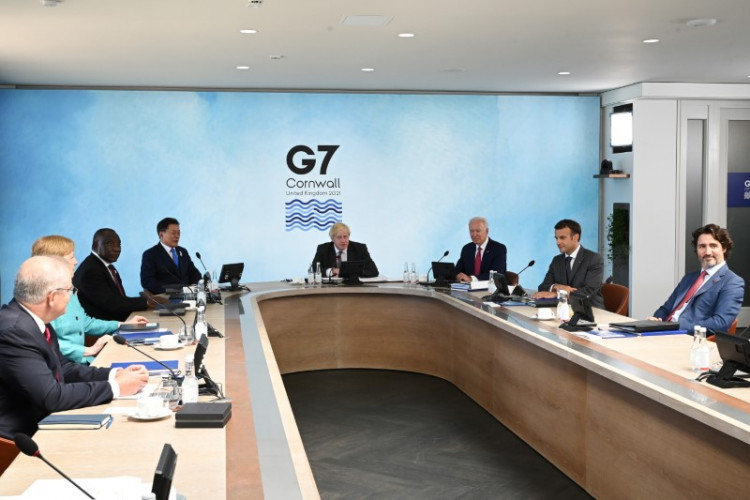China denounced Monday a joint statement by the Group of Seven leaders that scolded China over a range of issues as a gross interference in the country's internal affairs and told the bloc to stop slandering China.
The G-7 leaders Sunday took China to task over human rights in the heavily Muslim region of Xinjiang, called for Hong Kong to keep a high degree of autonomy and underscored the importance of peace and stability across the Taiwan Strait - all highly sensitive issues for Beijing.
China's embassy in London said it was strongly dissatisfied and resolutely opposed to mentions of Xinjiang, Hong Kong and Taiwan that distorted the facts and exposed the "sinister intentions of a few countries such as the United States."
With the Covid-19 pandemic still raging and global economy sluggish, the international community needs unity and cooperation of all countries rather than "cliquey" power politics sowing division, it added.
China is a peace-loving country that advocates cooperation, but also has its bottom lines, the embassy said.
"China's internal affairs must not be interfered in, China's reputation must not be slandered, and China's interests must not be violated," it added.
"We will resolutely defend our national sovereignty, security and development interests, and resolutely fight back against all kinds of injustices and infringements imposed on China."
G-7 leaders this past weekend tackled China and the risk of future pandemics, as the bloc of wealthy nations advertised a renewed Western unity at its first physical summit since 2019.
In a 25-page joint statement issued Sunday, G-7 leaders urged China "to respect human rights and fundamental freedoms, especially in relation to Xinjiang and those rights, freedoms and high degree of autonomy for Hong Kong."
The G-7 would continue to deliberate on ways to address China's behavior in the global economy, according to the same section of the statement.
The leaders also demanded a new probe into the origins of the coronavirus pandemic. The statement echoed calls from the U.S., the European Union and the U.K. for more investigation into the origins of Covid-19, which was discovered in the central Chinese city of Wuhan.
"We always believe that countries, big or small, strong or weak, poor or rich, are equals, and that world affairs should be handled through consultation by all countries," the Chinese embassy in London said after the talks Saturday. "The days when global decisions were dictated by a small group of countries are long gone.
The G-7 statement also outlined measures to offset Chinese influence in developing countries, specifically its Belt and Road Initiative, by pooling resources to fund infrastructure projects.
The joint statement Sunday also agreed to a number of initiatives, including donating 1 billion Covid-19 vaccine doses to impoverished countries over the next year, ending government subsidies for foreign coal projects and imposing a minimum 15% tax on large multinational corporations.
According to the leaders, the tax initiative will help reverse a "40-year race to the bottom," raise more tax revenues and eliminate tax avoidance.






